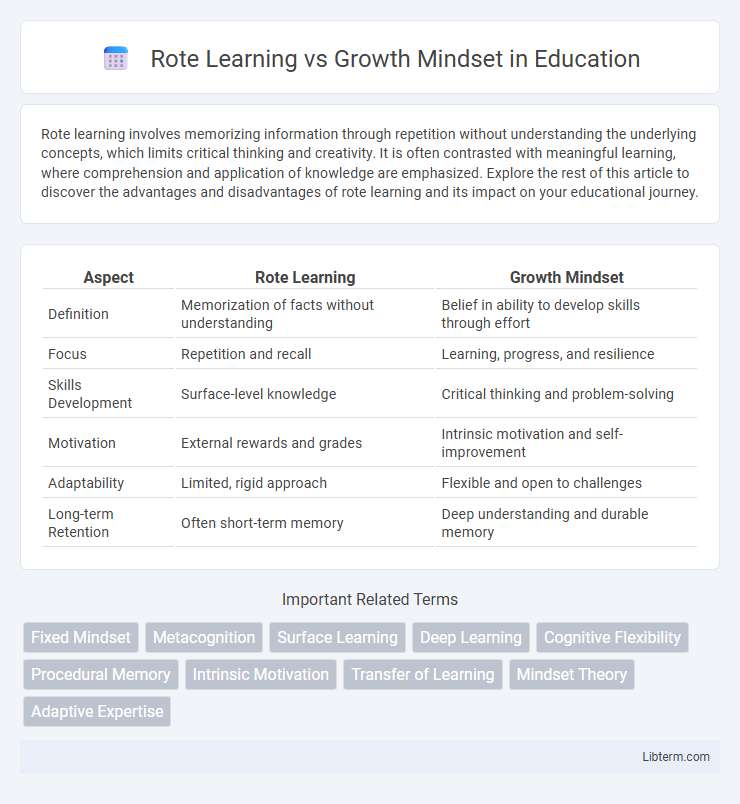Rote learning involves memorizing information through repetition without understanding the underlying concepts, which limits critical thinking and creativity. It is often contrasted with meaningful learning, where comprehension and application of knowledge are emphasized. Explore the rest of this article to discover the advantages and disadvantages of rote learning and its impact on your educational journey.
Table of Comparison
| Aspect | Rote Learning | Growth Mindset |
|---|---|---|
| Definition | Memorization of facts without understanding | Belief in ability to develop skills through effort |
| Focus | Repetition and recall | Learning, progress, and resilience |
| Skills Development | Surface-level knowledge | Critical thinking and problem-solving |
| Motivation | External rewards and grades | Intrinsic motivation and self-improvement |
| Adaptability | Limited, rigid approach | Flexible and open to challenges |
| Long-term Retention | Often short-term memory | Deep understanding and durable memory |
Understanding Rote Learning: Definition and Characteristics
Rote learning is a memorization technique focused on repetition without understanding the underlying meaning, often involving the recall of facts, formulas, or procedures verbatim. It is characterized by passive acquisition of information, limited critical thinking, and short-term retention, which contrasts with more dynamic cognitive processes. This method can be effective for foundational knowledge but generally lacks the adaptability and deeper comprehension emphasized in growth mindset approaches.
What is a Growth Mindset? Core Principles Explained
A growth mindset is the belief that abilities and intelligence can be developed through dedication, learning, and effort, contrasting with rote learning which emphasizes memorization without understanding. Core principles include embracing challenges, persisting in the face of setbacks, valuing effort as a path to mastery, learning from criticism, and finding inspiration in others' success. This mindset fosters continuous improvement and resilience, promoting deeper comprehension and long-term academic achievement.
Key Differences Between Rote Learning and Growth Mindset
Rote learning emphasizes memorization and repetition without understanding the underlying concepts, leading to surface-level knowledge retention. In contrast, a growth mindset prioritizes learning through challenges, embracing mistakes as opportunities for development and fostering deeper comprehension. While rote learning often results in fixed knowledge, a growth mindset encourages adaptability and continuous improvement.
Historical Perspectives on Learning Approaches
Historical perspectives reveal rote learning as a dominant educational approach in traditional systems, emphasizing memorization and repetition for knowledge retention. The growth mindset, rooted in Carol Dweck's research in the late 20th century, contrasts this by promoting adaptability, persistence, and the belief that intelligence can develop through effort and experience. The shift from rote learning to growth mindset frameworks marks a paradigm change toward cultivating critical thinking and lifelong learning skills in modern education.
Advantages and Limitations of Rote Learning
Rote learning offers the advantage of quick memorization and retention of factual information, making it effective for subjects requiring precise recall such as vocabulary or formulas. However, its limitations include a lack of deep understanding and critical thinking, often leading to difficulties in applying knowledge to new or complex situations. This method can also hinder creativity and problem-solving skills, which are crucial components of a growth mindset.
Benefits of Cultivating a Growth Mindset
Cultivating a growth mindset enhances cognitive flexibility and promotes resilience by encouraging individuals to embrace challenges and learn from failures, leading to sustained academic and personal development. Unlike rote learning, which relies on memorization without deep understanding, a growth mindset fosters critical thinking and problem-solving skills essential for adapting to complex real-world situations. Research indicates that students with a growth mindset demonstrate higher motivation, improved achievement, and greater psychological well-being compared to those who depend solely on rote memorization techniques.
Impact on Academic and Personal Development
Rote learning emphasizes memorization and repetition, often leading to superficial understanding and limited problem-solving skills, which can hinder long-term academic achievement and personal growth. In contrast, a growth mindset fosters resilience, curiosity, and adaptive learning strategies, promoting deeper comprehension and continuous improvement in academic performance. Embracing a growth mindset enhances self-efficacy and motivation, contributing to stronger emotional intelligence and lifelong personal development.
Strategies to Shift from Rote Learning to Growth Mindset
Implement targeted strategies such as fostering curiosity through open-ended questions and encouraging reflective thinking to transition from rote learning to a growth mindset. Emphasize effort and progress by integrating goal-setting techniques, frequent feedback, and celebrating mistakes as learning opportunities. Utilize metacognitive exercises and promote collaborative learning environments to cultivate resilience and adaptability in students.
Real-World Examples: Success Stories and Case Studies
Companies like Google exemplify the growth mindset by fostering continuous learning and innovation, resulting in breakthrough products such as Google Search and Android. In contrast, rote learning often limits adaptability, as seen in traditional educational settings where students memorize information without understanding, leading to lower problem-solving skills. Studies from Stanford University highlight that employees encouraged to embrace growth mindset strategies demonstrate higher creativity and resilience compared to those relying solely on rote memorization.
Future Trends in Education: Embracing the Growth Mindset
Future trends in education emphasize embracing the growth mindset, which fosters resilience, critical thinking, and adaptability compared to rote learning's focus on memorization. Educational technology and personalized learning platforms increasingly support growth mindset principles by encouraging students to engage deeply with material and learn from mistakes. This paradigm shift aligns with workforce demands for creativity and problem-solving, making growth mindset-based education essential for preparing learners in a rapidly evolving global economy.
Rote Learning Infographic

 libterm.com
libterm.com